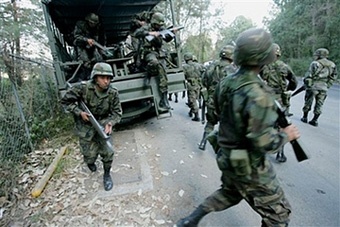
|
 |
 |
 Editorials | Issues | January 2008 Editorials | Issues | January 2008  
Mexico Rights Official Says Army Tortured, Raped
 Miguel Angel Gutierrez - Reuters Miguel Angel Gutierrez - Reuters
go to original
mexsoldiers


| | Mexican army soldiers arrive at a forest near the resort town of Valle de Bravo, 90 miles (145 kilometers) west of Mexico City after a firefight with gunmen Tuesday Jan. 22, 2008. Four men were detained but other escaped into the woods during an operation that involved army, state and federal police. (AP/Mario Vazquez de la Torre) | | |
Mexico City - Mexican soldiers tortured, raped and murdered civilians last year while fighting a war across the country against violent drug gangs, the nation's top human rights official told lawmakers on Wednesday.

The army and navy, which play a leading role in President Felipe Calderon's campaign against organized crime, should be withdrawn to their barracks, said Jose Luis Soberanes, head of the country's human rights commission.

"Individuals belonging to the armed forces committed grave abuses," he told Mexico's Congress. "In 2007, we widely documented cases of torture, rape and homicide."

For example, 19 soldiers face a military trial for shooting dead two women and three children in June at a roadblock in the state of Sinaloa, a hotspot in the drug conflict.

In another case, soldiers have been accused of sexually assaulting four girls in the western state of Michoacan.

More than 25,000 federal police, soldiers and marines are hunting drug gangs near the U.S. border and in other troubled areas around the country.

They search cars along highways, raid suspected criminal hideouts and often skirmish with heavily armed hitmen.

Soberanes said the military should be withdrawn gradually and replaced with a beefed up federal police force.

There was no official response from defense officials but Soberanes said the army had been responsive to some of his suggestions.

Washington is keeping an eye on human rights issues in Mexico's drug crackdown, as the U.S. Congress debates a proposal to fund $550 million of surveillance equipment as the first tranche of $1.4 billion pledged by President George W. Bush last year under the so-called Merida Initiative.

However, the U.S. Assistant Secretary for the Bureau of International Narcotics and Law Enforcement Affairs David Johnson said on Wednesday he did not see pressure to put human rights monitors on the ground.

(Additional reporting by Catherine Bremer; Editing by Cynthia Osterman) | 
 | |
 |



